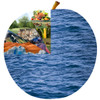Grades 3–12 (Kit)
Teach global land and water distribution with a hands-on model! The Apple Land Use Model offers a powerful visual to help students understand how Earth’s resources are divided and why only a small portion of land is available for growing food. By “slicing” the Earth as an apple, students see the challenges of feeding a growing population and the importance of resource stewardship.
This oversized apple model (16.5" x 17.5") is constructed of two durable styrene layers with a sturdy handle on the back. Magnetic sections allow teachers to reveal step by step how much of the Earth’s surface is water, habitable land, inhospitable regions, and agricultural land for crops and livestock. Some assembly required—handle ships unattached.
Kit Contents
- Large Apple Land Use Model (16.5" x 17.5")
- Durable styrene board construction with magnetic top layer
- Handle for demonstration (ships unattached)
- Teacher narrative script (see below)
Teacher Narrative Script
Use the following narrative with the Apple Land Use Model to demonstrate how the distribution of Earth's water and land resources affects food production:
- Hold up the Apple Land Use Model. “This apple represents the planet Earth.”
- Remove and hold up the ¾ piece. “Nearly three-quarters of the Earth is covered in water.”
- Point to the remaining ¼ of the apple. “The remaining quarter represents land area.”
- Remove and hold up the bottom 1/12 piece. “This section represents inhospitable land including deserts, mountains, and polar regions that are not suitable for people to live or grow crops.”
- Remove and hold up the next 1/12 piece. “This section represents habitable land that is not used for agriculture including nature preserves, public land, and developed areas like roads, schools, houses, etc.”
- Remove and hold up the 3/48 piece. “This section shows agricultural land used to graze livestock and grow their feed; livestock provide humans with milk, meat, eggs, and other byproducts."
- Remove and hold up the 1/48 piece. “This section represents agricultural land where crops are grown for humans to eat.”
Lesson Plans
Use this model alongside related lessons available on the National Agricultural Literacy Curriculum Matrix where you’ll also find additional background information and teaching tips to support instruction.
Extend the Learning
Encourage students to connect this model to discussions about sustainability, food security, and population growth. Have students calculate how much food needs to be produced on the small portion of agricultural land available, or explore global examples of land use challenges.









